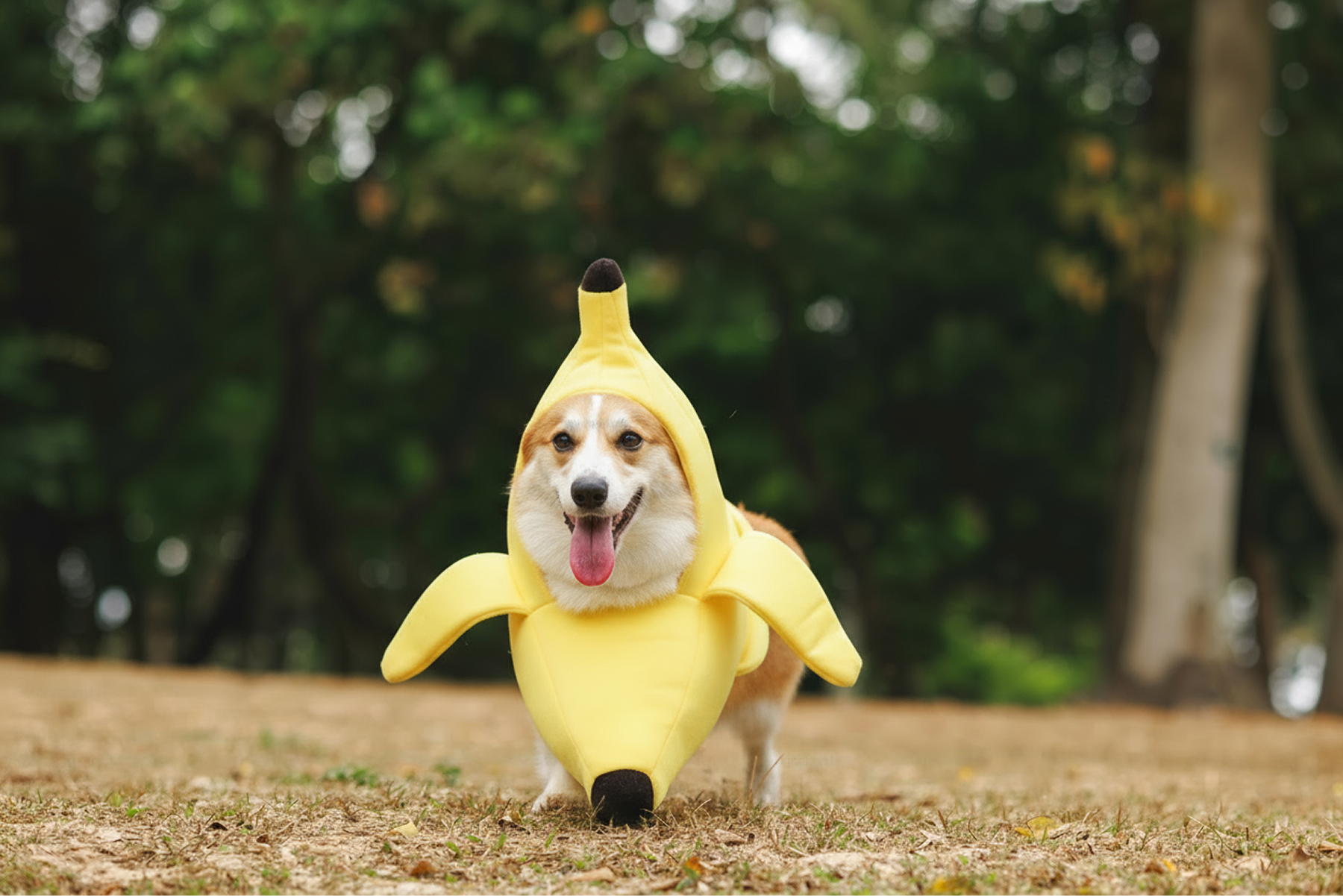Tricks, Treats & Spring Heat: Keeping Perth Pets Safe This Halloween
At Drovers Vet Hospital, we know that October brings both opportunities for outdoor fun and hidden dangers that every Perth pet owner should be aware of. Whether your pet loves the warmer weather or gets anxious around Halloween excitement, we've got essential safety tips to keep them healthy and happy.
Halloween Safety Essentials for Perth Pets
Halloween might be fun for families, but it can present serious risks to our four-legged friends. Here's what every Perth pet owner needs to know to keep their companions safe during the spookiest night of the year:

Toxic Treat Territory
The biggest Halloween danger isn't ghosts or goblins—it's the abundance of toxic treats that suddenly appear in homes across Perth. Chocolate remains the number one emergency we see at Drovers during Halloween week.
Know the warning signs of chocolate toxicity:
- Vomiting and diarrhoea
- Excessive panting or restlessness
- Increased heart rate
- Seizures in severe cases
Other Halloween hazards include:
- Sugar-free lollies containing xylitol (extremely toxic to dogs)
- Raisins and sultanas in baked goods
- Macadamia nuts in homemade treats
- Alcohol left unattended during adult Halloween parties
Keep all trick-or-treat bags well out of paw's reach, and brief family members about the dangers of "sharing" Halloween goodies with pets.

Costume Considerations
While that superhero costume might look adorable on your pup, pet costumes can cause serious stress and safety issues. If you choose to dress up your pet:
Safety checklist:
- Ensure free movement and comfortable breathing
- Avoid small parts that could be chewed off and swallowed
- Check that vision and hearing aren't impaired
- Never leave a costumed pet unattended
- Watch for signs of distress: excessive panting, trying to remove costume, or unusual behaviour
Many pets prefer a festive bandana or collar to a full costume—let your pet's comfort level guide your decision.
Doorbell Stress Management
Halloween's constant stream of trick-or-treaters can turn even the most social pet into an anxious mess. The repeated doorbell ringing, excited children, and unusual costumes create a perfect storm for pet stress.
Create a calm environment:
- Set up a quiet "safe zone" away from the front door
- Use familiar blankets and favourite toys
- Consider playing calming music to mask doorbell sounds
- Keep pets secure to prevent escape when doors are frequently opening
For extremely anxious pets, discuss natural calming supplements with our team before Halloween night.

Spring Weather Health Considerations
October's warming temperatures bring their own set of health considerations as Perth transitions from winter's cooler days to spring's increasing heat and activity levels.
Parasite Activity Increases
Warmer October weather creates ideal conditions for fleas, ticks, and other parasites to become more active. After months of lower parasite activity during winter, many pet owners are caught off-guard by the sudden increase.
Post-outdoor adventure checklist:
- Thoroughly inspect your pet's coat, paying special attention to warm areas like armpits and groin
- Check between toes and around ears for embedded ticks
- Look for flea dirt (small black specks) in the fur
- Our in-house laboratory can provide quick parasite screenings if you discover anything concerning
Grass Seed Season Begins
October marks the beginning of Perth's notorious grass seed season. These seemingly innocent seeds can work their way into paws, ears, noses, and coats, causing painful infections and requiring surgical removal in severe cases.
Prevention strategies:
- Check paws thoroughly after every walk, especially between toes
- Inspect ears for seeds that may have entered the canal
- Keep grass areas in your yard well-maintained and short
- Consider protective booties for dogs with sensitive paws
Early Heat Awareness
While October isn't Perth's hottest month, temperatures can climb unexpectedly, and pets who've been comfortable with longer walks during winter may not be ready for sudden temperature spikes.
Watch for early heat stress signs:
- Excessive panting during normally comfortable activities
- Seeking shade more frequently
- Reluctance to continue walks
- Drooling more than usual
Gradually increase exercise intensity as temperatures rise, and always carry water during outdoor adventures.

Top Perth Spring Safety Destinations
As the weather warms, these Perth locations offer safe, enjoyable experiences for pets ready to embrace spring:
Kings Park and Botanic Garden
Perfect for leashed walks among spring wildflowers, with plenty of shade and water fountains. The sealed paths are easier on paws than rough bush tracks, and the diverse environment provides excellent mental stimulation.
Best for: Dogs building fitness after winter, senior pets, and those who enjoy people-watching.
Whiteman Park
Offers both on-leash and designated off-leash areas with good shade coverage. The park's size allows for gradual exercise increases, and the variety of environments helps dogs adapt to different spring scenarios.
Best for: Social dogs, families wanting picnic opportunities, and pets needing space to run safely.
Point Walter Reserve
Combines riverside walks with off-leash beach access (seasonal restrictions apply). The combination of grass, sand, and water provides varied exercise opportunities while the river offers cooling relief on warmer days.
Best for: Water-loving dogs, confidence building, and Instagram-worthy family photos.
Essential October Health Preparations
Allergy Season Preparation
Perth's spring brings increased pollen and environmental allergens that can affect sensitive pets. October is an ideal time to assess your pet's allergy management before peak season arrives.
Watch for allergy warning signs:
- Increased scratching or licking
- Red, watery eyes
- Recurring ear infections
- Hot spots or skin irritation
Early intervention can prevent more serious allergic reactions as pollen counts increase through spring and summer.
Hydration Becomes Critical
As temperatures climb, proper hydration becomes increasingly important. Many pets who were content with minimal water during winter need time to adjust their drinking habits.
Hydration strategies:
- Provide multiple water stations around your home and yard
- Carry a collapsible bowl during all outdoor activities
- Monitor water intake—sudden increases or decreases can indicate health issues
- Consider adding wet food to your pet's diet for additional moisture
Exercise Routine Adjustments
After months of shorter, cooler walks, many pets need gradual conditioning to handle longer, warmer exercise sessions safely.
Build fitness gradually:
- Increase walk duration by 5-10 minutes weekly
- Schedule exercise during cooler morning or evening hours
- Watch for signs of fatigue and respect your pet's limits
- Provide rest breaks during longer adventures
Your Partner in Seasonal Health
At Drovers Vet Hospital, we believe proactive care is the key to helping pets transition safely through Perth's seasonal changes. October's unique combination of Halloween hazards and spring weather shifts requires vigilant pet ownership and professional support.

Concerned about your pet's spring readiness or Halloween safety? Our team is here to help you navigate this transitional period with confidence. From allergy management to emergency preparedness, we'll ensure your furry family member is ready for the warmer months ahead.
Contact Drovers Vet Hospital today to schedule an October wellness check and receive a personalised spring safety plan for your pet. Because every Halloween should be treats, not tricks—especially for our four-legged family members!
Heading 1
Heading 2
Heading 3
Heading 4
Heading 5
Heading 6
Lorem ipsum dolor sit amet, consectetur adipiscing elit, sed do eiusmod tempor incididunt ut labore et dolore magna aliqua. Ut enim ad minim veniam, quis nostrud exercitation ullamco laboris nisi ut aliquip ex ea commodo consequat. Duis aute irure dolor in reprehenderit in voluptate velit esse cillum dolore eu fugiat nulla pariatur.
Block ed do eiusmod tempor incididunt ut labore et dolore magna aliqua. Ut enim ad minim veniam, quis nostrud exercitation ullamco laboris nisi ut aliquip ex ea commodo consequat. Duis aute irure dolor in reprehenderit in voluptate velit esse cillum dolore eu fugiat nulla pariatur.
Ordered list
- Item 1
- Item 2
- Item 3
Unordered list
- Item A
- Item B
- Item C
Bold text
Emphasis
Superscript
Subscript

Although chocolate may be one of your favourite treats, never feed chocolate to your pet. It is poisonous for them! It contains substances called theobromine and caffeine (methylxanthine alkaloids) which are also contained in coffee, tea and some over-the-counter stimulants.
Chocolate poisoning is most commonly seen in dogs because of their habit to ingest food rapidly and they often have a “sweet tooth”. We see a higher incidence in puppies and young dogs, probably because they tend to ingest large amounts of unusual foods.
Chocolate poisoning can also affect cats, birds, rodents and reptiles however we see these cases much less frequently.
Symptoms of Chocolate Poisoning
The toxins in chocolate can affect you pet’s digestive system, nervous system and cardiovascular system.
Digestive system
- Vomiting & diarrhoea (2-4 hours after ingestion)
Nervous System
- Excitation/restlessness (increased body temperature, alertness)
- Muscle rigidity & tremors
- Seizures
Cardiovascular
- Increased respiratory rate
- Increased heart rate
- Reduced blood pressure (hypotension)
- Progresses to cardiac failure leading to weakness, coma and death can occur within 12-36 hours after ingestion.
The toxins are found in the highest concentration in cooking chocolate and dark chocolate, and there are lesser amounts in milk chocolate. There is almost no toxins are found in white chocolate.
Diagnosis
Chocolate poisoning can look similar to many poisonings or other conditions. Serious poisonings such as that caused by strychnine, amphetamines, pesticides, and some rodenticides can cause similar signs.
If you know your pet has eaten chocolate, contact us immediately, especially if your pet is showing any of the symptoms above. If possible, bring any vomit to the clinic as well, since this may aid in rapid identification of the toxic substance. Your veterinarian will need to examine your dog's nervous system and cardiac function carefully. He/she may want to run some blood tests to check for blood sugar levels and rule out other diseases. Since this poisoning progresses rapidly, signs may need to be treated symptomatically until a laboratory diagnosis is confirmed.
Treatment
There is no antidote for chocolate poisoning. Your veterinarian may use drugs to induce vomiting if the chocolate was consumed within the previous 2 - 4 hours or they may even need to administer a general anaesthetic in order to pass a tube into the stomach to wash
Once the chocolate is out activated charcoal treatment may be given to prevent any toxins remaining from being absorbed.
Pets that show more severe symptoms may need more specific medications in order to control the seizures and to prevent heart failure.
The expected course of chocolate poisoning is 12 to 36 hours depending on the dosage and effectiveness of treatment. Prognosis is good if the chocolate is removed within 2 to 4 hours of ingestion. Prognosis is guarded in animals with advanced signs such as seizures and serious heart dysfunction. So, please remember to keep your chocolates, cakes and chocolate-coated goodies safely away from your pets. Stick to healthy treats if you want to reward your special furry or feathered friend.
Have more questions?
Our state-of-the-art facility offers separate consultation rooms for dogs and cats, a fully equipped in-house laboratory, and specialised suites for surgery and dental care. For those tender moments, our uniquely designed Grief.









